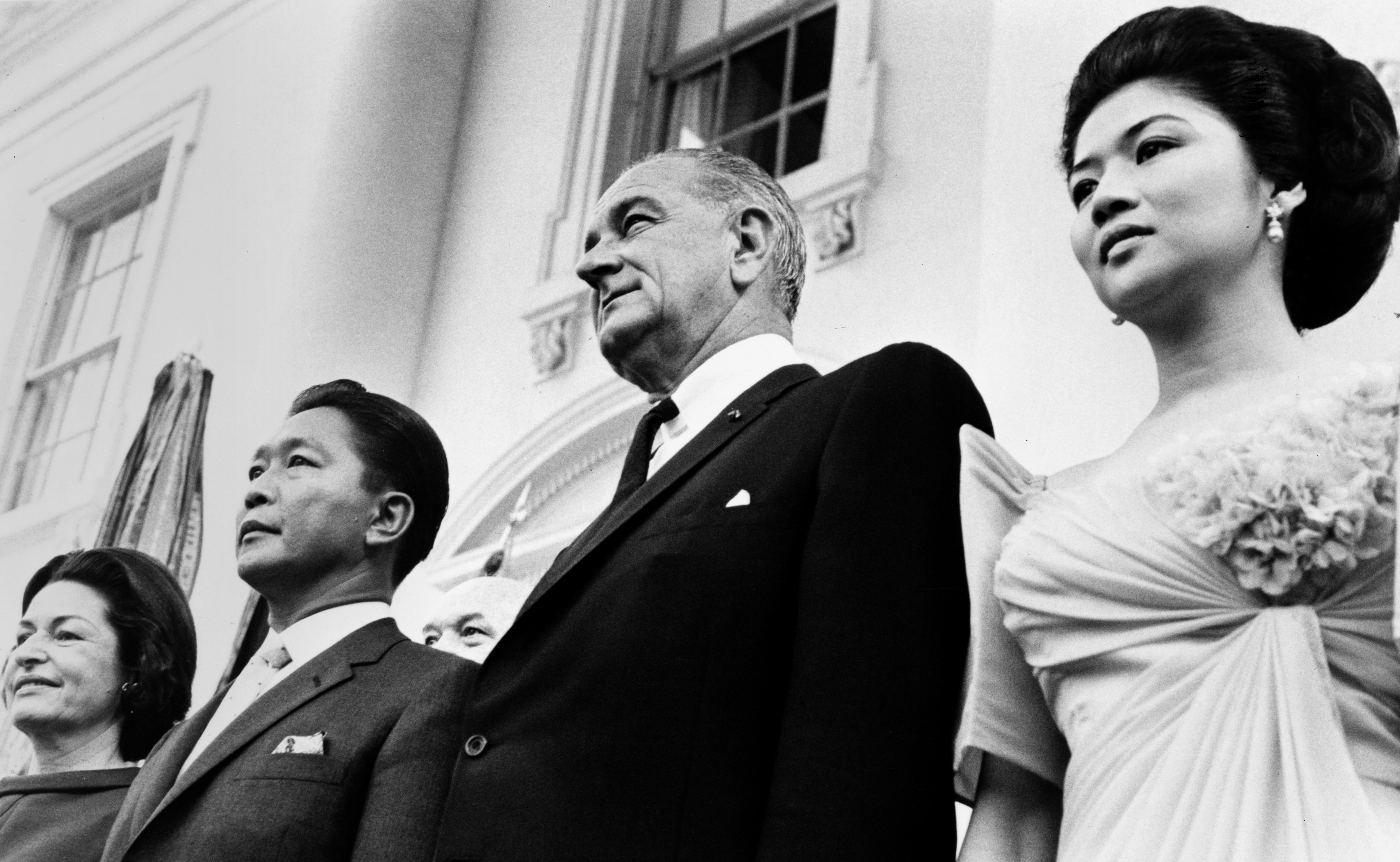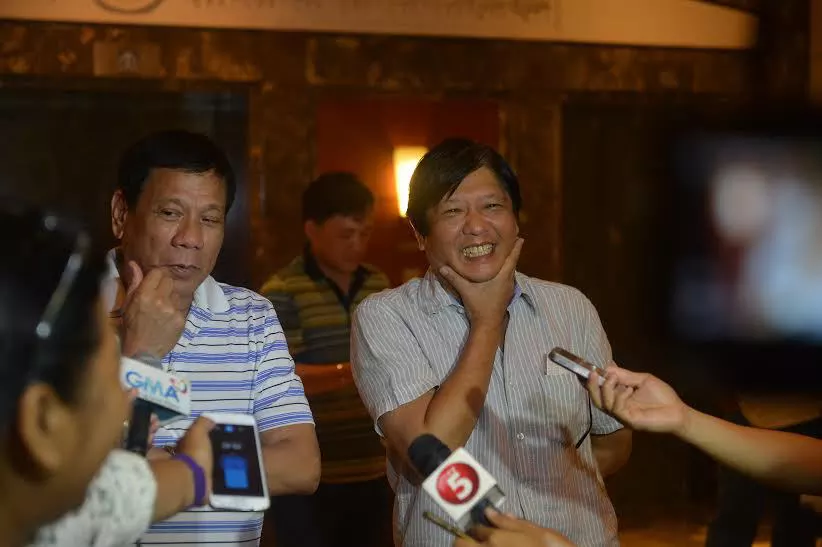Philippine President Rodrigo Duterte Thinking of Burying Dictator Ferdinand Marcos in National Cemetery as Hero

MANILA, Philippines – It’s often said that young people have become clueless about Martial Law. If the protest on a holiday is any indication, however, then it can be said that some millennials have not forgotten.
Student leaders from different universities gathered in front of the oblation statue in the University of the Philippines – Diliman on Wednesday, July 6, to oppose the planned burial of former president Ferdinand Marcos at the Libingan ng mga Bayani.
Marcos’ son, defeated vice presidential candidate Ferdinand “Bongbong” Marcos Jr, said that he had met with President Rodrigo Duterte who was eyeing a September burial for the late president at the Libingan.
Student representatives from University of the Philippines Diliman, Manila and Cebu, Ateneo De Manila University, Far Eastern University and Polytechnic University of the Philippines held pictures of young Martial Law activists who either disappeared or died while remembering the battles they fought for during the said era.
Included in the lineup of people commemorated were Jun Quimpo, Cristina Catalla, Emmanuel Alvarez, Rizalina Ilagan, Leo C. Alto, Juan Escandor, Nona Del Rosario, Gerardo Faustino, Ronald Quimpo, Bobby Dela Paz and Ma. Leticia Ladlad, all victims of Martial Law.
Martial Law is blamed for at least 3000 executions and 35,000 torture cases, according to military historian Alfred McCoy.
“Patuloy nating pangangaralan ang buhay ng mga bayani na nag-alay ng kanilang buhay para sa kalayaang tinatamasa natin ngayon,” fresh Ateneo graduate Yesu Hernandez said while holding the photo of Emmanuel Alvarez.
(We will continue to commend the heroes who gave up their lives for the freedom that we have right now.)
Not a golden era
The protest, titled #BawatBato, is a youth-organized event that follows the same initiative done on June 26 where human rights victims under Martial Law went to the heroes’ cemetery to lay stones at the grave site supposedly assigned for the dictator. (READ: Building a foundation of dissent vs Marcos dynasty)
The stones laid below the Oblation statue, just like the ones in the Libingan ng mga Bayani, had written in them names of people kidnapped, tortured and murdered during those times.
Aida Santos, a Martial Law survivor who joined the Diliman Commune when she was a student, said in the event: “Sinasabi nila na golden years ang Martial Law. Kami ang buhay na patunay na hindi ‘yan totoo. Sinasabi nila, ‘kunin niyo na lang ang pera niyo, huwag na kayong umangal, move on’. Hindi ito issue ng pera; ito’y isyu na kami’y nakilaban bata pa kami, binigay na namin ang buhay namin sa aming paniniwala na ito ang tama.”
(They say that Martial Law are golden years. We are the living proof that such is not true. They say, “just get the money and move on”. It’s not an issue of money, it is the fact that we fought for this when we were young and that we fought for this knowing that this is the right thing to do.)
She added that they might be wrong in many things, but they were not wrong in opposing Martial Law.
“Maaaring nagkamali kami sa Diliman Commune, maaaring marami kaming pagkakamali, pero ang hindi ho kami nagkamali, kami ho ay naninindigan para sa kalayaan at para sa demokrasya, at hanggang ngayon, tatayo kami hanggang huling hibla ng aming hininga,” Santos added.
(We might be wrong in the Diliman Commune, we might be wrong in many things, but we are sure that we are not wrong that we stood up for freedom and democracy, and we will stand for it until our last breath.)
Meeting of different generations
Rafaela David, chairperson of Akbayan Youth, understands that opposing a Marcos burial at the national heroes’ cemetery would be difficult.
“Ito ‘yung importanteng panahon para magsama-sama, iba’t ibang henerasyon mula sa Martial Law activists mula pa noong 1970s, 1980s. Ngayon, ‘yung mga kabataang lider naman ng henerasyon ngayon, ‘yung tinatawag nating millennials,” she said.
(This is the important time for people of different generations, from Martial Law activists in the 70s and 80s to the youth leaders – the millennials – that we have today)
She added that the protest aims to fight the historical revisionism of the pro-Marcos groups.
“This is a meeting of different generations to make sure that the fight for democracy and human rights, the fight to to make sure that the history of martial law is told truthfully, at the end of the long struggle, will still win,” David added.
Activist Clara Balaguer echoed the challenges that comes with the opposition and confirmed reports that security forces at the heroes’ cemetery has restricted people from visiting the site.
“We were approached by two military personnel, they took our stones, escorted us into the office, and we were given a ‘friendly lecture’. Our IDs were taken, photographs taken, and we were given a convoluted lecture on why we were not allowed to do our protest there,” she narrated.
She said, however, that the guards lied. “I said, I looked up at malacanang.gov.ph and Libingan ng mga Bayani is listed as a tourist attraction along with Manila North Cemetery… We’ve been to the site many times as tourists, cameras, no problem, whatsoever’,” she added.
While Balaguer said that they were not scared with how they were treated, she found it alarming “to hear the lies, and the lies to your face.”
Education in schools
Former Commission on Human Rights chairperson Etta Rosales, the keynote speaker of the event, said that the agency under her term has collated oral histories of the human rights violations during the Martial Law era, including the Palimbang Massacre in 1974.
“Kailangan kasama ng event na ito ang pananaliksik. Ang gawin ninyo, himay-himayin niyo with your social science teachers – the students and the teachers. Likhain natin yung alyansa ninyo. So ‘yung social science teachers will look into this and will make some human rights education modules para dito,” she said.
(This event should also call for research. What you should do is expound on the topic with your social science teachers. Forge the alliance between teachers and students. So that your social science teachers will look into this and will make some human rights education modules on Martial Law)
Rosales added that she has talked to former education secretary Bro. Armin Luistro and they both discussed the project with newly appointed secretary Leonor Briones,whom she said is their “dear friend.”
Quoting Vice President Leni Robredo, she said: “Remember, ‘The powers of bringing the nation together are much more powerful than the powers that divide the nation and keep them apart.”
Dwight Angelo De Leon is the president of DZUP Radio Circle, the official student organization arm of the University of the Philippines Diliman’s official AM radio station, DZUP 1602. He is also currently an intern for Rappler.


